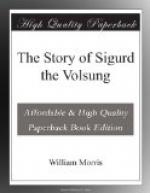Then Sigurd awhile was silent; but at
last he answered and said:
“Thou shalt have thy will and the
treasure, and shalt take the curse on
thine head
If a curse the gold enwrappeth: but
the deed will I surely do,
For today the dreams of my childhood hath
bloomed in my heart anew:
And I long to look on the world and the
glory of the earth
And to deal in the dealings of men, and
garner the harvest of worth.
But tell me, thou Master of Masters, where
lieth this measureless wealth;
Is it guarded by swords of the earl-folk,
or kept by cunning and stealth?
Is it over the main sea’s darkness,
or beyond the mountain wall?
Or e’en in these peaceful acres
anigh to the hands of all?”
Then Regin answered sweetly: “Hereof
must a tale be told:
Bide sitting, thou son of Sigmund, on
the heap of unwrought gold,
And hearken of wondrous matters, and of
things unheard, unsaid,
And deeds of my beholding ere the first
of Kings was made.
“And first ye shall know of a sooth,
that I never was born of the race
Which the masters of God-home have made
to cover the fair earth’s face;
But I come of the Dwarfs departed; and
fair was the earth whileome
Ere the short-lived thralls of the Gods
amidst its dales were come.
* * * * *
“It was Reidmar the Ancient begat
me; and now was he waxen old,
And a covetous man and a king; and he
bade, and I built him a hall,
And a golden glorious house; and thereto
his sons did he call,
And he bade them be evil and wise, that
his will through them might be
wrought.
Then he gave unto Fafnir my brother the
soul that feareth nought,
And the brow of the hardened iron, and
the hand that may never fail,
And the greedy heart of a king, and the
ear that hears no wail.
“But next unto Otter my brother
he gave the snare and the net,
And the longing to wend through the wild-wood,
and wade the highways wet:
And the foot that never resteth, while
aught be left alive
That hath cunning to match man’s
cunning or might with his might to strive.
“And to me, the least and the youngest,
what gift for the slaying of ease?
Save the grief that remembers the past,
and the fear that the future sees;
And the hammer and fashioning-iron, and
the living coal of fire;
And the craft that createth a semblance,
and fails of the heart’s desire;
And the toil that each dawning quickens
and the task that is never done;
And the heart that longeth ever, nor will
look to the deed that is won.
“Thus gave my father the gifts that
might never be taken again;
Far worse were we now than the Gods, and
but little better than men.
But yet of our ancient might one thing
had we left us still:
We had craft to change our semblance,
and could shift us at our will
Into bodies of the beast-kind, or fowl,
or fishes cold;




